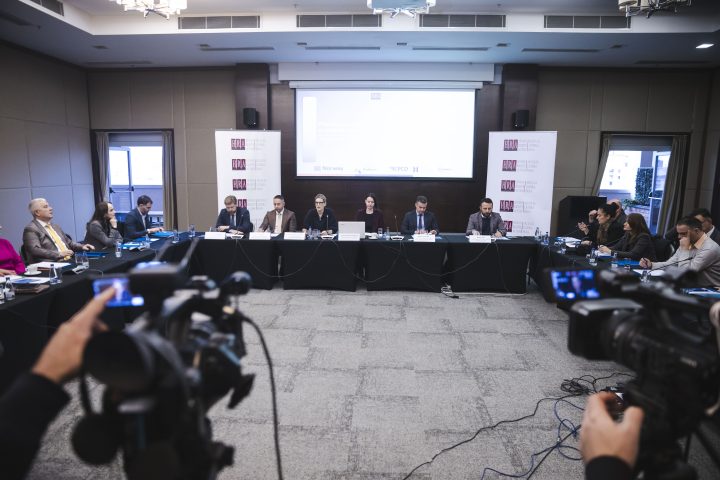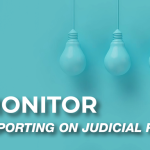
N1.T7 – Inertness of the Judicial Council Is Threatening the Transparency and Independence of the Judiciary
20/11/2024
33 YEARS SINCE THE JNA SHELLING OF DUBROVNIK’S OLD TOWN
06/12/2024HRA SURVEY SHOWS THAT A THIRD OF JUDGES AND PROSECUTORS, MORE THAN THREE QUARTERS OF ATTORNEYS, AND TWO THIRDS OF COURT EXPERTS BELIEVE THAT THERE IS CORRUPTION IN THE JUDICIARY

A third of the judges (33.7%) and almost a third of the state prosecutors (31.7%) who participated in the survey that was carried out by the NGO Human Rights Action and the agency DeFacto Consultancy – Judicial Actors’ Perception of Corruption – state that corruption in the Montenegrin judiciary does in fact exist. However, there are many more attorneys (79.9%) and court experts (63.1%) who believe in the existence of corrupt practices in courts and prosecutor’s offices.
The Director of the NGO Human Rights Action, Tea Gorjanc Prelević, said that the fear that corruption and crime have entered the Montenegrin judiciary is in fact justified, as 10 criminal proceedings have been initiated in the last few years against former holders of highest judicial and prosecutorial offices.
“It is a fact that a third of judges and almost a third of prosecutors believe that there is corruption. We think that this is very important information that should be taken into account, and which requires special measures if it is to be dealt with”, said Gorjanc-Prelević.
Professor Olivera Komar, who presented the results, spoke about the significance of these types of surveys. She said that it is important to determine the perception because it changes individuals’ behaviour.
“If you believe that the system is not as it should be, when you think there is a problem you will try to find your way around it. And that is how perception influences behaviour and becomes reality”, explained Komar.
Judge and member of the Judicial Council, Rade Ćetković, said that the presented data should serve as a signal for the judiciary.
“The Judicial Council should devise mechanisms to recognise these phenomena, and then absolutely act to eliminate them. These cases should also receive an epilogue in court”. Ćetković also noted that changes of this magnitude cannot be achieved quickly.
Member of the Judicial Council, Miodrag Iličković, claims that it is necessary to devise a plan. “Short term, medium term and long term. And that must be the state’s strategy”, he said.
Momir Jauković, Director of the Justice Directorate in the Ministry of Justice, talked about possible changes, as well as the state of the judiciary.
“How can we come to a solution when we are constantly having elections? We had five ministers in the Ministry of Justice in the last four years, while, on the other hand, we had acting officials in the judiciary for quite a long time”, said Jauković. He also stated that the fact that the position of his department changes from one minister to another affects the implementation of public policies.
Commenting on the findings on the perception of corruption in the judiciary, attorney Andrej Raspopović, member of the Board of Directors of the Bar Association, believes that we cannot talk about corruptive actions in the judiciary because cases go through several instances that are competent for them.
“It is impossible to corrupt that many people in order to receive a decision that is favourable for you. Even if it is not impossible, the percentage is really small”, said Raspopović.
Furthermore, the HRA survey showed that almost a third of judges (29.5%) and a quarter of state prosecutors (25.8%) have noticed corruption in the judiciary in the last three years. The percentage was higher when the question was answered by attorneys and court experts – corruption in the judiciary is observed the most by legal representatives (69.7%) and court experts (35.8%). On the other hand, 46.3% of judges and 49.8% of prosecutors did not notice any corruption in their ranks in the last three years.
The survey showed that almost every second interviewed judge (48.5%) and slightly fewer prosecutors (43.9%) see that the risk of corrupt actions exists in the system of judges’ and prosecutors’ advancement.
“The election of judges has not been fair all these years, and it is not fair now”, said attorney Raspopović. He also said that his colleagues do not trust judges because the judicial practice (case law) is uneven, and it is impossible to know what type of decision they will make and how they will act.
“Judges and state prosecutors see salary increases as the most effective way to reduce the risk of corruption. On the other hand, attorneys and court experts believe that it is the introduction of audio-visual recording of hearings and interrogations that would contribute the most”, Professor Komar explained the obtained survey data.
Only 22.1% of judges believe that they are adequately paid for what they do, but the percentage of those who are satisfied with their earnings is significantly higher among prosecutors. Namely, 56.1% of prosecutors believe that they are adequately paid, while only a third of court experts feel the same.
Once the survey data were presented, the President of the Association of Court Experts of Montenegro, Marko Lakić, said that the today’s hourly wages of hairdressers and masseurs are many times higher than the EUR 9.5 that court experts receive. He also raised a question regarding the earnings in the courts and prosecutor’s offices.
“How can someone be motivated to be a prosecutor or a judge when s/he can have a salary that is two or three times higher working as a lawyer in a state-owned company? I believe that any judge or prosecutor would be welcomed as lawyers in such companies”, said Lakić.
However, Miodrag Iličković believes that a higher salary should not be the main argument for creating a better status for judges.
“If they continue to insist only on salaries – and the politicians just love to reduce the problem of the judiciary to just salaries, especially the Prime Minister – the judges will fall into a hole that they themselves have dug”, he said.
The President of the High Court in Podgorica, Zoran Radović, is also of the opinion that problems in the judiciary cannot be solved only by increasing salaries.
“Working conditions must be significantly improved. And we don’t know when that will happen. There is talk about the Special Court, the Palace of Justice, but who knows how many years will pass before something is done”, said Radović.
Prosecutor and member of the Prosecutorial Council, Nikola Samardžić, who works in Herceg Novi in a building that was constructed during the era of the Austro-Hungarian Empire, is not much more of an optimist.
“Things change very slowly here. This is my fourth year as a member of the Prosecutorial Council, and one of the first topics was the famous relocation of the Special Prosecutor’s Office to the old Government building. However, it is very likely that our mandate will expire next year without anything having been done about it”, said Samardžić.
Court expert Lakić explained the scope of the problem that is caused by the lack of adequate space for the work of judges and prosecutors.
“When we go to them, sometimes we can’t even see them, not to mention being able to sit and put your things down. They work in tiny rooms, buried under cases, files and other documentation”, says Lakić.
The President of the Appellate Court, Mirjana Popović, believes that one of the problems of the judiciary is the lack of transparency. It is necessary, she claims, to establish a better relationship with the non-governmental sector and the media.
“There is no obstacle for the sessions of the Judicial Council to be broadcast live. I don’t see why that would be problematic”, said Popović. She claims that this would also reduce perceived corruption in the judiciary among the citizens.
The President of the High Court in Podgorica, Zoran Radović, believes that it is necessary to increase the transparency of his court, but that this requires employing judicial interns.
The President of the Basic Court in Podgorica, Željka Jovović, also spoke about the importance of hiring judicial interns, who are currently unmotivated by low salaries.
Inappropriate pressure and bribery
Part of HRA’s survey referred to inappropriate pressures aimed at influencing acting in certain cases in the past three years.
Such pressure was experienced by 2.4% of surveyed state prosecutors and 5.3% of judges. A similar result was noted among the surveyed attorneys (11.9%) and court experts (8.7%).
61.5% of lawyers answered that some judges do take bribes to act in a certain way in certain cases. The opinion was quite different among the other respondents – namely, only 17.4% of court experts, 9.5% of judges and 7.3% of prosecutors agreed.
Almost half of the surveyed attorneys (47.7%), 14.1% of court experts, and 7.4% of judges believe that certain state prosecutors take bribes. Not a single state prosecutor agreed with this statement.
The majority of attorneys (61.4%), 14.8% of judges and 14.6% of state prosecutors believe that court experts take bribes. 16.3% of court experts did agree with this statement.
More than a third of the surveyed members of the Bar Association of Montenegro (36.7%) believe that attorneys give bribes to certain judges and prosecutors.
Introduction of vetting
Although the introduction of vetting is being discussed at the highest level in Montenegro, less than half of the surveyed judges (42.1%) and almost a quarter of the prosecutors (24.4%) agree with the idea of introducing a phased vetting of the integrity of employees in the judiciary. It is mostly attorneys that do agree with the idea (72.5%), followed by court experts (66.3%).
However, the results of the HRA survey show that holders of judicial offices are ready to contribute to reducing corruption and the perception of corruption in the judiciary – if vetting were to be introduced, as many as 78% of prosecutors would be willing to undergo examination, as well as 71.6% of judges.
Only 7.3% of prosecutors and 3.2% of judges stated that they would resign if that should happen.
The President of the Commercial Court of Montenegro, Mladen Grdinić, said that he would not mind being among the first to be vetted, but that he is not in favour of implementing a phased vetting, believing that it should be carried out as soon as possible. He warned of the problem we would face if we did not have a sufficient number of trained individuals.
“If vetting is introduced and results in an exit of judges from the profession… don’t go to that phase if you don’t have an extremely efficient replacement system”, said Grdinić. He warned that the Commercial Court is missing three judges, and that “three years ago that Court had only three judges”.
Attorney Raspopović claimed that, prior to doing the vetting, it would be necessary to fill all vacant positions in the judiciary and train people to take over the work of judges and prosecutors who failed to pass the vetting.
The survey Judicial Actors’ Perception of Corruption, which was conducted by the NGO Human Rights Action in cooperation with the agency DeFacto Consultancy, was conducted from 12 July to 18 September 2024. It included the following: 41 prosecutors (40.1%), 92 court experts (43.8%), 95 judges (34.7%) and 109 attorneys (6.8%). It was carried out as part of the project “Reforming the Judiciary for the Rule of Law”, which the HRA is implementing with the support of the regional project “SMART Balkans – Civil society for a connected Western Balkans”, implemented by the Centre for the Promotion of Civil Society (CPCD) with partners, and financially supported by the Ministry of Foreign Affairs of the Kingdom of Norway.






 English
English